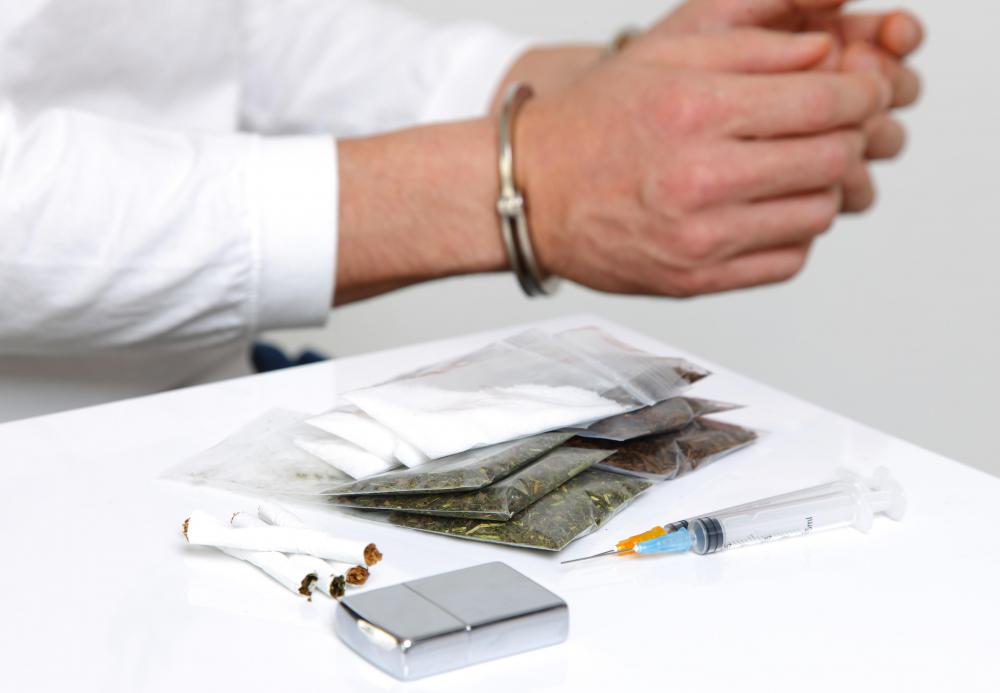At WiseGEEK, we're committed to delivering accurate, trustworthy information. Our expert-authored content is rigorously fact-checked and sourced from credible authorities. Discover how we uphold the highest standards in providing you with reliable knowledge.
What Are the Most Common Symptoms of Drug Dependence?
The common symptoms of drug dependence include tolerance, withdrawal, and inability to stop using. Addicts spend a lot of time figuring out how to obtain drugs, and they may also act criminally to get the substances they need because they are driven by an overwhelming and a seemingly unconquerable sense that they cannot survive without them. Moreover, substance dependence has common outward signs that may be, but are not always, noticed by the addict or other people in his life.
As people become substance-dependent, tolerance is established. This means that former amounts used are not enough to produce the same effects. The addict often takes greater amounts of the drug in an effort to obtain a satisfactory feeling.

In drug dependence, tolerance is directly linked to withdrawal. Since the body is more used to the addictive substance and needs it more regularly, it begins to produce withdrawal symptoms quickly, which can include agitation, nervousness, emotional changes, and nausea/vomiting. These feelings make it very difficult to stop using, and most addicts return to the drug used in order to stop withdrawal effects. In a sense, they’ve transitioned from the original purpose of the drug, i.e., sedation, relaxation, or pain relief, to using it to avoid or stop withdrawal.

The symptoms of tolerance and withdrawal partly explain why it is so difficult to arrest the cycle of drug dependence. Addicts may feel like there is no way to stop without incurring very negative physical symptoms. Emotional dependence on the drug is frequently established, too, and people may believe they have no choice but to keep using. Those with substance addiction may often entertain the notion of quitting, but many can’t stop without help because tolerance, withdrawal, and emotional dependence are a triple-threat barrier.

Living with drug dependence frequently means spending a lot of time each day figuring out how to get or maintain a drug supply. People may commit crimes to get drugs, whether they are illegal or are only available by prescription. They might doctor shop, a practice where multiple doctors are seen to obtain new prescriptions, and they could steal or commit acts of prostitution to pay for illegal drugs. Even when substances are available easily, like alcohol, their use reduces normal cautionary behavior, resulting in acts like driving under the influence.
Relatives or friends can notice some signs of substance dependence. These include frequent episodes of altered, "drugged," behavior. A disinterest in previously important activities or dropping all friends in favor of one or two new acquaintances is also suspicious. Quick emotional changes and sudden failure in work or school may be symptomatic of drug dependence, too, as is missing money or property, which may signify the individual’s attempts to obtain needed substances.
AS FEATURED ON:
AS FEATURED ON:













Discussion Comments
Doctors are very good at prescribing pain medication, but not always as good at helping people ramp down their dosages. They just cut their patients off and go blithely on.
My friend's husband was on morphine after surgery, and the doctor just stopped the dosage, rather than bringing him off it gradually over a period of time. He was in pretty bad shape, since he had been on a moderately high dose for a couple of weeks, which is enough to create physical dependence. It took him a week to detox from it and my friend really let the doctor have it. The doctor said it wasn't long enough to be addicted and my friend nearly decked him.
Suffice it to say, by the time she left, the doctor understood very well the effects the morphine had on her husband.
There are many 12-step programs designed to help an addict recover, and the crux of every program is that addiction is a "cunning, baffling" disease. Addicts, no matter what their drug of choice may be, will do nearly anything to stay addicts, all the while their true selves are miserable, hopeless and helpless.
An addict will lie, cheat and even steal to obtain the drug of choice. I have a dear friend who became addicted to painkillers. She ended up in jail for a time for possession and trafficking. Thank the Lord, she agreed to court-ordered rehab, and she's stayed clean, but she's still a convicted felon. It's sad. Addiction is horrible.
Post your comments